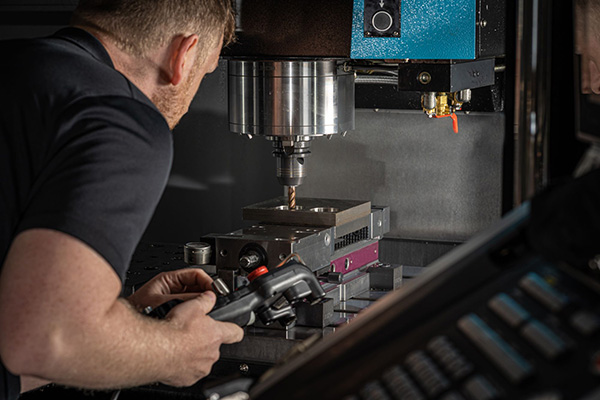Discover CNC precision machining and explore 10 industries that rely on this cutting-edge technology for producing high-quality parts.
CNC precision machining is a manufacturing process that uses computer-controlled machines to create complex parts with high accuracy. This technology has revolutionized production across many industries, allowing for faster, more precise, and more consistent results than traditional manual methods. From aerospace to healthcare, CNC machining plays a crucial role in creating the products people use every day.
In this article, explore what CNC precision machining is and look at some key industries that rely on this advanced manufacturing technique.
CNC stands for Computer Numerical Control. This means that instead of human operators controlling the machines directly, computers guide the tools to shape materials according to precise specifications. Here’s how it works:
Design Phase
Engineers create a 3D model of the desired part using computer-aided design (CAD) software. This digital blueprint serves as the foundation for the entire machining process.
CNC Programming
The CAD model is converted into a set of instructions that the CNC machine can understand. This code tells the machine exactly how to move and what operations to perform.
Setup
The raw material is loaded into the CNC machine, and the appropriate cutting tools are installed.
Machining
The computer-controlled tools then cut, drill, and shape the material according to the programmed instructions. This can involve multiple steps and tools, all coordinated by the computer.
Quality Control
Once machining is complete, the part is inspected to ensure it meets the required specifications.
CNC machining services offer several advantages over traditional manufacturing methods. It allows for:
These advantages make CNC machining a go-to choice for industries requiring intricate parts.
Now, look at some key industries that heavily depend on CNC machining technology:

1. Aerospace
The aerospace industry demands parts with extremely tight tolerances and high reliability. CNC machining delivers on both fronts. From turbine blades to landing gear components, precision-machined parts are essential for aircraft safety and performance. For example, a jet engine might contain hundreds of intricately machined parts, each playing a crucial role in its operation.
2. Automotive
Car manufacturers use CNC machining to produce engine components, transmission parts, and even custom aftermarket accessories. The ability to quickly prototype and manufacture parts with consistent quality is crucial in this fast-paced industry. Think about the pistons in your car’s engine – they need to be machined to exact specifications to ensure proper performance and fuel efficiency.
3. Medical Devices
The medical field relies on CNC machining to create precise instruments, implants, and prosthetics. These parts often require complex geometries and must be made from biocompatible materials. Surgical tools, joint replacements, and dental implants are just a few examples of medical devices produced using CNC technology.
4. Electronics
While we often think of electronics as being primarily circuit boards, many electronic devices contain precision-machined components. CNC machining is used to create casings, heat sinks, and other structural elements for computers, smartphones, and other gadgets. The aluminum body of a high-end laptop, for instance, is typically CNC machined for both aesthetics and functionality.
5. Defense and Military
The defense industry requires parts that can withstand extreme conditions while maintaining tight tolerances. CNC machining is used to produce components for firearms, vehicles, and communication equipment. For example, the housing for a rugged military radio might be CNC machined to ensure it’s both lightweight and durable.
6. Energy Sector
From oil and gas exploration to renewable energy, CNC machining plays a vital role in the energy sector. It’s used to create specialized drilling equipment, turbine components for wind power, and precision parts for solar panel mounting systems. The ability to work with a wide range of materials, including exotic alloys, makes CNC machining indispensable in this field.
7. Consumer Goods
Even everyday items often contain CNC-machined parts. High-end appliances, sporting equipment, and luxury goods frequently incorporate precision-machined components. For instance, the body of a professional-grade camera might be CNC machined from a solid block of aluminum for superior durability and heat dissipation.
8. Robotics and Automation
As automation becomes more prevalent across industries, the demand for precision-machined robot components is growing. CNC machining is used to create everything from robot arms to specialized end effectors (the “hands” of robots). These parts require high accuracy to ensure smooth and reliable operation in automated systems.
9. Aerospace and Space Exploration
Beyond traditional aerospace applications, CNC machining is crucial for space exploration. Satellites, space probes, and even components for the International Space Station rely on precision-machined parts. The extreme conditions of space demand materials and designs that can only be achieved through advanced manufacturing techniques like CNC machining.
10. Emerging Technologies
As new technologies emerge, CNC machining adapts to meet their needs. Industries like quantum computing, advanced materials research, and nanotechnology all benefit from the precision and flexibility offered by CNC machining. These cutting-edge fields often require custom-made components that push the boundaries of what’s possible in manufacturing.
Precision CNC machining technology continues to evolve, with advancements in areas such as:
These developments are expanding the capabilities of CNC machining, making it an even more valuable tool for industries across the board.
CNC precision machining has become an indispensable technology in modern manufacturing. Its ability to produce complex, high-quality parts with consistency and efficiency has made it essential in industries ranging from aerospace to consumer electronics. As technology advances, CNC machining will likely play an even more significant role in shaping the products of tomorrow.
About the Author:
John Smith is a manufacturing technology expert with over 15 years of experience in the CNC machining industry. He regularly writes about advanced manufacturing techniques and their applications across various sectors.
Scott Ellyson, CEO of East West Manufacturing, brings decades of global manufacturing and supply chain leadership to the conversation. In this episode, he shares practical insights on scaling operations, navigating complexity, and building resilient manufacturing networks in an increasingly connected world.